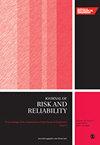Optimal post-warranty replacement policy based on number of product failures for the second-hand product
IF 1.8
4区 工程技术
Q3 ENGINEERING, INDUSTRIAL
Proceedings of the Institution of Mechanical Engineers Part O-Journal of Risk and Reliability
Pub Date : 2023-09-02
DOI:10.1177/1748006x231194899
引用次数: 0
Abstract
This paper deals with a post-warranty maintenance model for the second-hand product as follows. The second-hand product of age [Formula: see text], which is assumed to be positive, is purchased with a fixed length of non-renewing warranty, during which the product is given a fixed number of preventive maintenances periodically by the dealer. At each preventive maintenance, the failure rate of the product is adjusted to some extent for the purpose of reducing the likelihood of product failure. At the expiration of warranty, the user starts to self-maintain the product until a pre-determined number of failures occur, at which time the product is replaced by another one. For each post-warranty failure, only a minimal repair is taken to restore the failed product to its previous functioning state. This paper aims to determine an optimal number of post-warranty product failures that minimizes the expected cost rate during the second-hand product’s life cycle. To this end, we derive a formula to evaluate the expected cost rate during the second-hand product’s life cycle by assuming a certain cost structure for maintaining the product during the life-span of the product and determine an optimal number of post-warranty product failures from the user’s perspective. And we provide a numerical example to illustrate our proposed optimal maintenance model by assuming a Weibull failure distribution. The main contribution of this work is to use the number of post-warranty failures to propose a maintenance model for the second-hand product, where the number of failures is in general easier to observe than the failure times.针对二手产品,基于产品故障次数的最优保后更换策略
本文对二手产品的保修期后维修模型进行了如下的研究。二手产品使用年限[公式:见文],假设为正,购买时为固定期限的不续保,在此期间由经销商定期对该产品进行固定次数的预防性维护。在每次预防性维护中,都会对产品的故障率进行一定程度的调整,以降低产品发生故障的可能性。保修期届满,用户自行维修产品,直至达到预定的故障次数,此时更换另一个产品。对于每一个保修期后的故障,只需进行最低限度的维修,将故障产品恢复到以前的功能状态。本文旨在确定一个最优的保修期后产品故障数量,使二手产品生命周期内的预期成本率最小化。为此,我们推导出一个公式,通过假设在产品生命周期内维护产品的一定成本结构来评估二手产品生命周期内的预期成本率,并从用户的角度确定产品保修期后的最佳故障次数。并给出了一个数值例子,通过假设威布尔故障分布来说明所提出的最优维修模型。这项工作的主要贡献是使用保修期后的故障数量来提出二手产品的维修模型,其中故障数量通常比故障次数更容易观察。
本文章由计算机程序翻译,如有差异,请以英文原文为准。
求助全文
约1分钟内获得全文
求助全文
来源期刊

Proceedings of the Institution of Mechanical Engineers Part O-Journal of Risk and Reliability
ENGINEERING, MULTIDISCIPLINARY-ENGINEERING, INDUSTRIAL
CiteScore
4.50
自引率
19.00%
发文量
81
审稿时长
6-12 weeks
期刊介绍:
The Journal of Risk and Reliability is for researchers and practitioners who are involved in the field of risk analysis and reliability engineering. The remit of the Journal covers concepts, theories, principles, approaches, methods and models for the proper understanding, assessment, characterisation and management of the risk and reliability of engineering systems. The journal welcomes papers which are based on mathematical and probabilistic analysis, simulation and/or optimisation, as well as works highlighting conceptual and managerial issues. Papers that provide perspectives on current practices and methods, and how to improve these, are also welcome
 求助内容:
求助内容: 应助结果提醒方式:
应助结果提醒方式:


